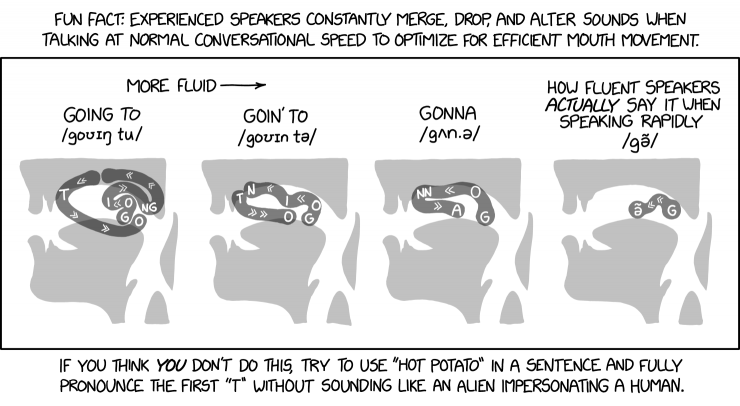Difference between revisions of "Main Page"
(→Rules) |
|||
| Line 1: | Line 1: | ||
__NOTOC__{{DISPLAYTITLE:explain xkcd}} | __NOTOC__{{DISPLAYTITLE:explain xkcd}} | ||
| + | [[File:Trump MAGA logo 2024.svg]] | ||
<center> | <center> | ||
<font size=5px>''Welcome to the '''explain [[xkcd]]''' wiki!''</font><br> | <font size=5px>''Welcome to the '''explain [[xkcd]]''' wiki!''</font><br> | ||
Revision as of 19:44, 15 April 2024
Welcome to the explain xkcd wiki!
We have an explanation for all 2942 xkcd comics,
and only 11
(0%) are incomplete. Help us finish them!
Latest comic
Explanation
| |
This explanation may be incomplete or incorrect: Created by a a BOT POTATO that is Gonna' impersonate a human - Please change this comment when editing this page. Do NOT delete this tag too soon. |
This comic starts with Randall stating that people often unconsciously shorten words in various ways when speaking to optimize the fluidity of speech. He then presents four diagrams of the human mouth and paths depicting how it moves when saying increasingly fluid versions of "going to."
The first diagram depicts the pronunciation closest to the typical diaphonemic representation of the phrase, /ɡoʊɪŋ tu/. The tongue moves a lot in this rendering, with the point of articulation starting next to the velum with /ɡ/, moving slightly forward to the hard palate with /ɪ/, back to the velum with /ŋ/, forwards to the alveolar ridge with /t/, and back towards the velum again with /u/.
The second diagram shows a slightly more efficient pronunciation, in which the /ŋ/ assimilates location to the following /t/ and the /u/ weakens to a more neutrally positioned /ə/. This way, the point of articulation starts at the velum, moves forward to the palate and alveolar ridge, and then finally moves back to the position of schwa, between the palate, velum, and uvula.
The third diagram shows an even more efficient and very common pronunciation of the phrase, /ɡʌnə/. The /t/ assimilates and merges with /n/, while the vowel(s) of the first syllable are either unrounded from /o/ to /ʌ/ (between which the only difference is the rounding, or protrusion of the lips), or, more likely, given Randall Munroe's prior comics calling /ʌ/ schwa, to [ə]. This greatly reduces the amount of distance the articulators must travel.
The fourth diagram shows the most reduced pronunciation. The /n/ is lost as a consonant and is only left as a nasal element on the remaining vowel. This way, the only motions that must be made are pulling the tongue away from the velum to articulate the /ɡ/, and opening the nasal passage. This "reduced pronunciation" would sound like a nasally "ge" and is unintelligible to the original phrase of "going to".
Lastly, he comments on the perception of reduced pronunciations, remarking that while they might out of context appear sloppy, in-context a full & unreduced pronunciation sounds stilted, forced, and unnatural.
Transcript
| |
This transcript is incomplete. Please help editing it! Thanks. |
- [Above the panel:]
- Fun fact: Experienced speakers constantly merge, drop, and alter sounds when talking at normal conversational speed to optimize for efficient mouth movement.
- [The panel shows four labeled side profiles of a mouth with paths of sounds made in different parts of the mouth. There is a label "More fluid" with an arrow pointing to the right. From left to right:]
- [Label:]
- Going to
- /ɡoʊɪŋ tu/
- [Path:] G O >> I >> NG >> >> >> T >> >> O
- [Label:]
- Goin' to
- /ɡoʊɪn tə/
- [Path:] G O >> I >> N T >> >> O
- [Label:]
- Gonna
- /ɡʌn.ə/
- [Path:] G O >> NN >> A
- [Label:]
- How fluent speakers actually say it when speaking rapidly
- /ɡə̃/
- [Path:] G >> >> ə̃
- [Below the panel:]
- If you think you don't do this, try to use "hot potato" in a sentence and fully pronounce the first "t" without sounding like an alien impersonating a human.
Is this out of date? .
New here?
Last 7 days (Top 10) |
|||||||||||||||||||||||||||||||||||||||||||||||||||||||
|
You can read a brief introduction about this wiki at explain xkcd. Feel free to sign up for an account and contribute to the wiki! We need explanations for comics, characters, themes and everything in between. If it is referenced in an xkcd web comic, it should be here.
- If you're new to wiki editing, see the explain xkcd:Editor FAQ for a specific guidance to this Wiki and the more general help on how to edit wiki pages. There's also a handy wikicode cheatsheet.
- Discussion about the wiki itself happens at the Community portal.
- You can browse the comics from List of all comics or by navigating the category tree at Category:Comics.
- There are incomplete explanations listed here. Feel free to help out by expanding them!
Rules
Don't be a jerk!
There are a lot of comics that don't have set-in-stone explanations; feel free to put multiple interpretations in the wiki page for each comic.
If you want to talk about a specific comic, use its discussion page.
Please only submit material directly related to (and helping everyone better understand) xkcd... and of course only submit material that can legally be posted (and freely edited). Off-topic or other inappropriate content is subject to removal or modification at admin discretion, and users who repeatedly post such content will be blocked.
If you need assistance from an admin, post a message to the Admin requests board.


